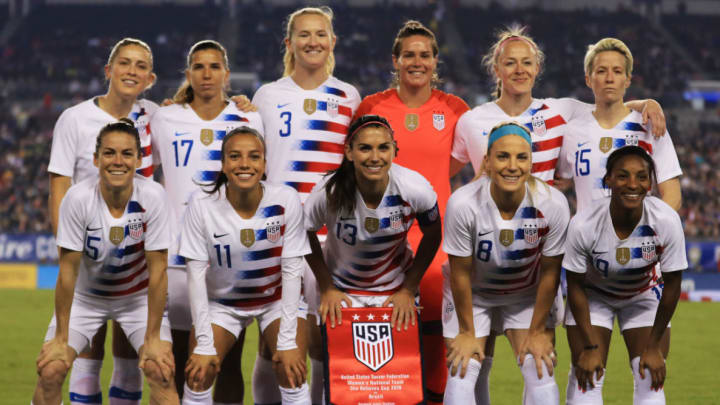USWNT Puts Equal Pay Discussion Back in Spotlight With New Lawsuit vs. U.S. Soccer

The players of the U.S. women’s national team got tired of waiting, and so on Friday, International Women’s Day and less than three months before the start of the World Cup, they sued U.S. Soccer in search of pay and treatment that are equal to the U.S. men’s team.
In many ways, the lawsuit is simply a furtherance of the complaint that USWNT players filed three years ago against the federation with the Equal Employment Opportunity Commission—a complaint that has essentially sat in purgatory ever since. But make no mistake, this lawsuit reignites the issue and will be a dominant topic of discussion as the team plays games before and during the Women's World Cup.
It marks a grander version of the case brought forward by former U.S. goalkeeper Hope Solo in August of last year, with the player accusing U.S. Soccer of committing the same violations in her own personal federal lawsuit that remains pending in California.
"I’d always hoped my former teammates would follow suit and join me in the battle in Federal Court against the United States Soccer Federation," Solo said in a statement on Friday. "It was clear that U.S. Soccer was never going to acquiesce or negotiate to provide us equal pay or agree to treat us fairly. The filing today by the entire United States women’s national team demonstrates that they no longer fear the Federation by forcefully and publicly acknowledging U.S. Soccer’s violations of the Equal Pay Act and Title VII."
In the days since Abby Wambach retired from soccer, she has said regularly that she wished she had done more during her career to fight for better treatment of women’s players. The 28 USWNT players who brought Friday’s lawsuit clearly don’t want to have those regrets, and they know that the three-decade history of the USWNT has shown that real gains have only come when the players have decided to go toe-to-toe with U.S. Soccer.
Will that make things uncomfortable between the players and the federation over the coming months with more eyes than ever on women’s soccer? You’d better believe it.
But that’s precisely why the players chose this timing of their lawsuit. Given the circumstances, we shouldn't expect any major changes on the field as a result of their action. U.S. Soccer isn’t going to do anything that would jeopardize the chances of winning a fourth Women’s World Cup this summer in France. And the players, who are pros and are unified, won’t either.
USWNTPA's statement on the Lloyd Morgan et. al v. USSF filing ⬇️ pic.twitter.com/wt7l8IYAAG
— USWNT Players (@USWNTPlayers) March 8, 2019
There’s no threat of a work stoppage here. But get ready for a lot of discussion—on equal pay, on revenues produced, on investment in the women’s game. And look for that discussion to ripple out into the wider world as other women’s national teams take their cues from the USWNT, which is what we’ve been seeing in recent years.
This fight won’t be settled soon. But it’s one that these USWNT players are viewing as part of their legacy—and every bit as important as what they accomplish on the field itself.

A leading soccer journalist and best-selling author, Grant Wahl has been with SI since 1996 and has penned more than three dozen cover stories.